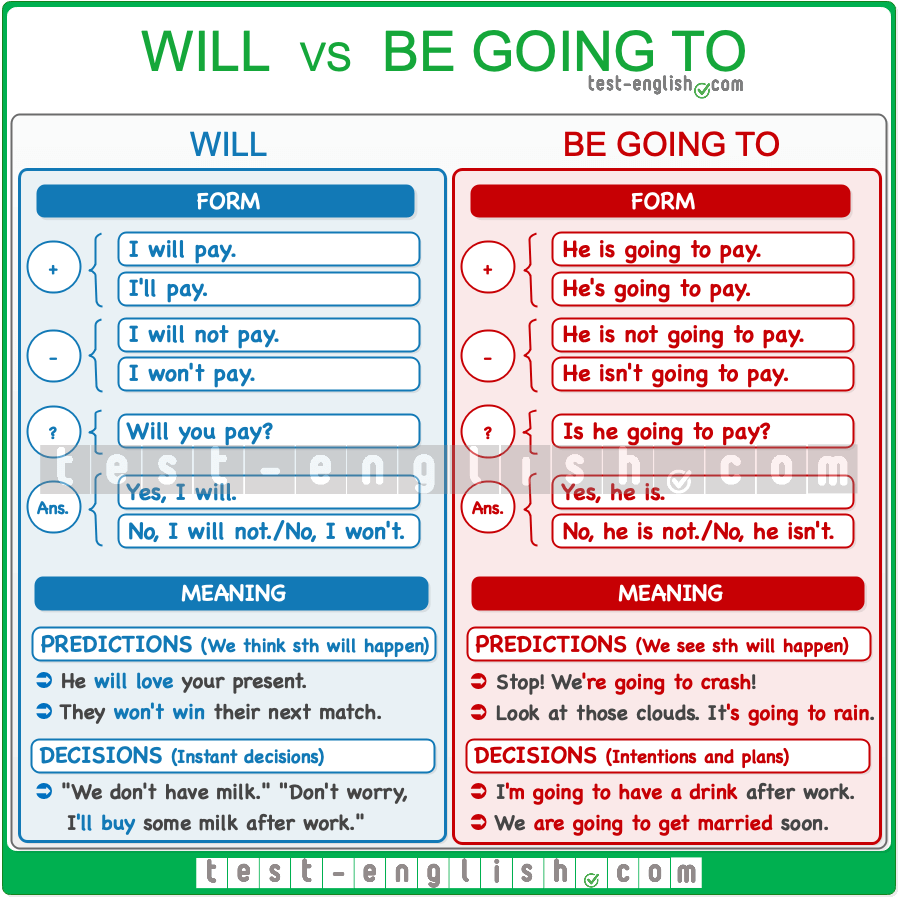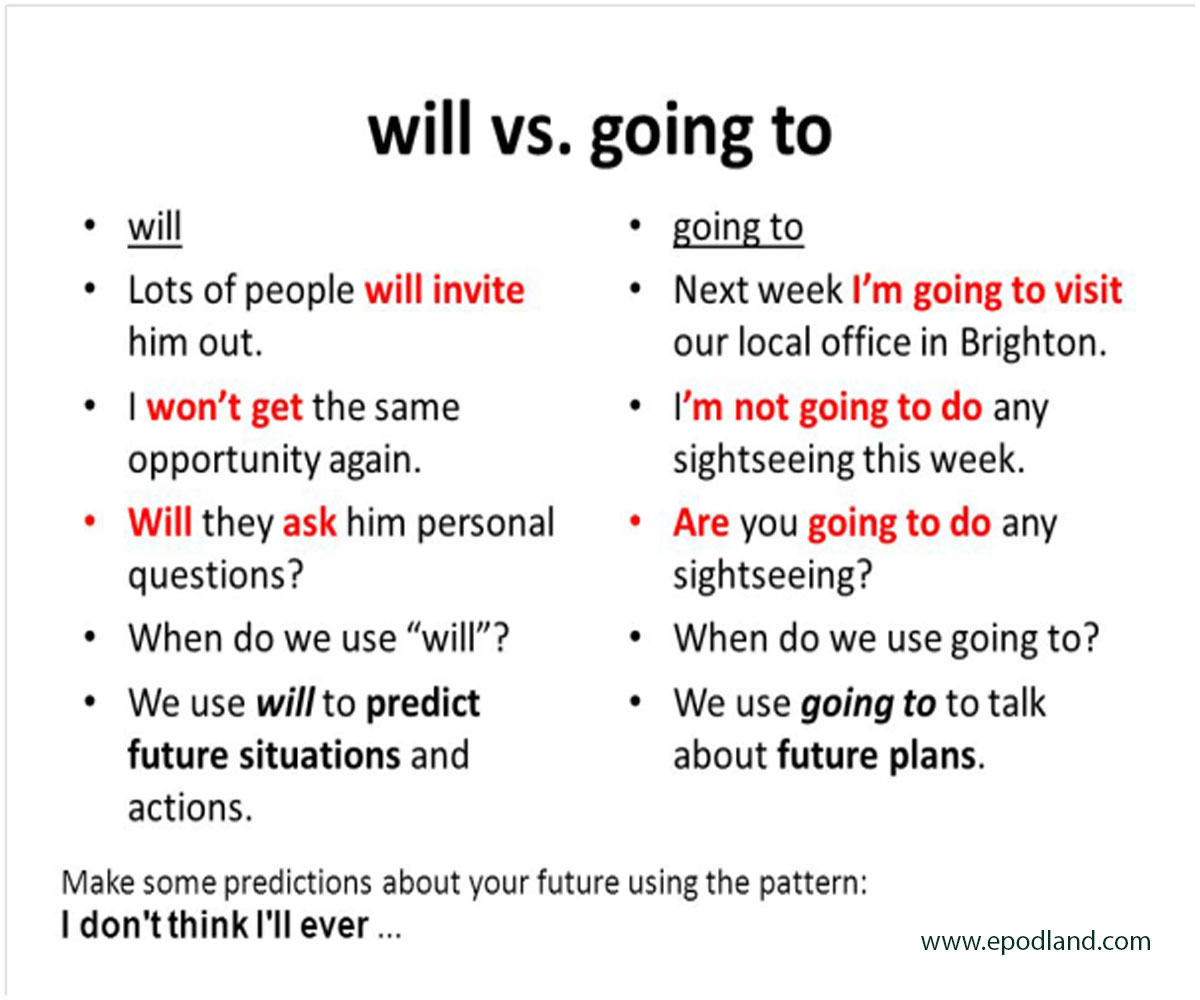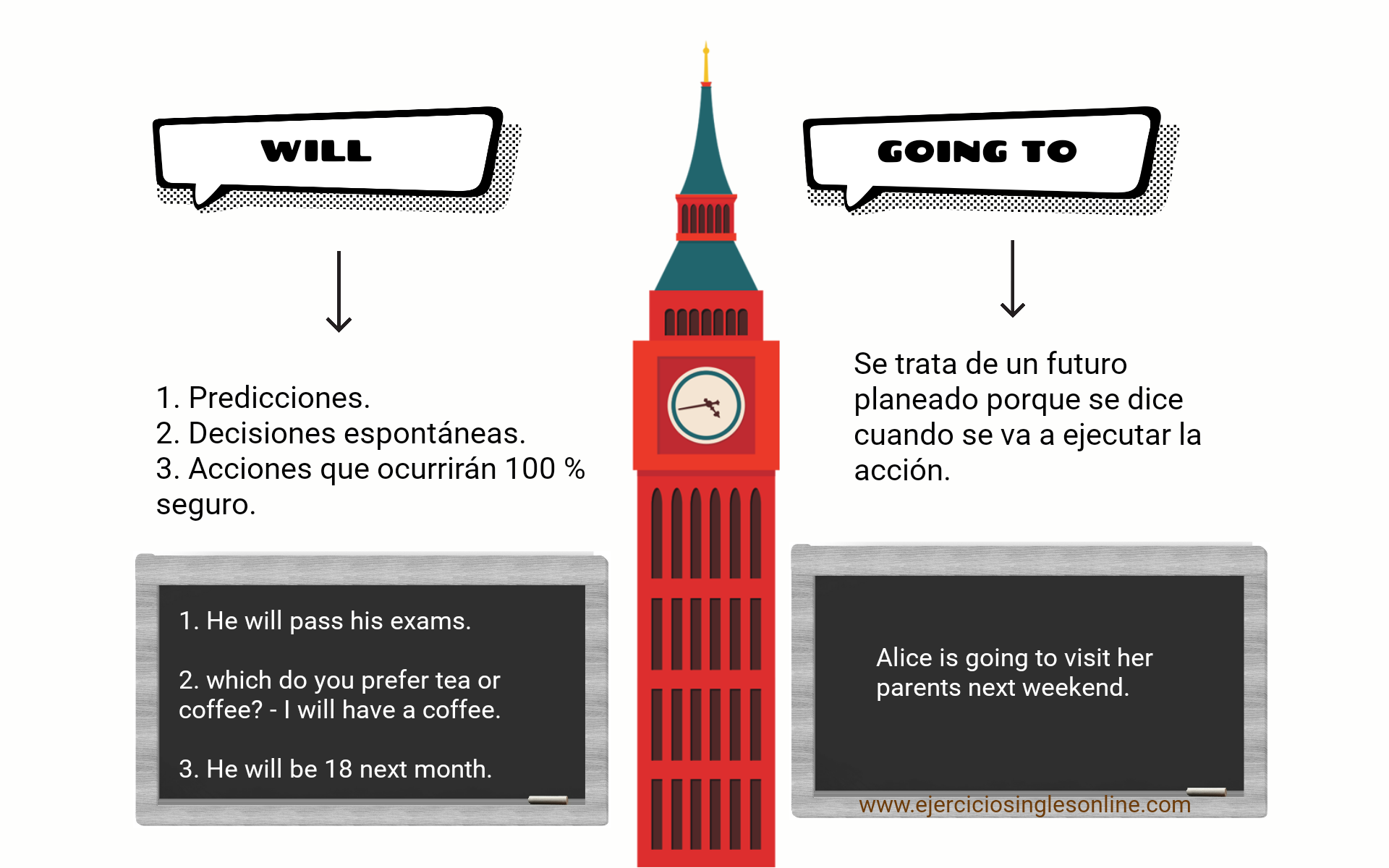
English How to use will and be going to in English, Differences Between “Will” and “Be going
1. I feel awful. I think I am going to fall ill. 2. Tonight I am going to stay up late. I have rented a video. 3. 'I will help you,' she said. 4. I completely forgot to send the money. I will do it now. 5. Look at the sky. It is going to rain now. 6. There is the doorbell. I will go. 7. Thanks for your help. I will never forget this. 8. I.

Diferenças Entre Will E Going To AskSchool
Students > Solutions > Pre-Intermediate > Grammar > Unit 6 - Exercise 1 - will and going to. Everyday English; Grammar Unit 6 - Exercise 1.

Will and Going To with KEY Learn english, English grammar worksheets, English teaching resources
The quick answer is that "will" and "be going to" are essentially the same. In English, both are tenses used for the Simple Future. (To learn more about the Simple Future, check out our Grammar Lesson of the Month post!) However, even though they are called the "Simple Future" tenses, they are not so simple. (Grammar joke!)

'Will' vs 'be going to' Future forms TestEnglish
Do you know the different uses of 'will' and 'be going to'?Let Georgina teach you when we say 'will' and 'be going to' in this English In A Minute.Watch the.

Will & Going to
Future tense: WILL or BE GOING TO with answers. tulpen25. 30244. 498. 197. 0. 1/2. Let's do English ESL general grammar practice. These are exercises to practice and consolidate the correct usage of WILL or BE GOING TO in English.

TOMi.digital SIMPLE FUTURE AND FUTURE WITH BE GOING TO
They are also used to make simple predictions and show your reactions to something that was just said. Use going to to talk about planned future events or events that you see is about to happen. In some cases, either could be used. Complete the following sentences with will or going to. 1. I can't lift this box. OK. I.

Pin on ENGLISH
"Will" and "going to" are used to refer to the future. In formal writing, there's one you should use over the other. We'll tell you which one. In formal writing, "will" and "going to" are used differently. Correct Use In casual speech and writing, will and going to are often interchanged.

WillFuture or GoingtoFuture Übungen Unterrichtsmaterial im Fach Englisch
Students have to decide whether to use BE GOING TO or WILL and justify their choice. this ESL worksheet contains a series of traditional grammar drills and exercises. 2895 uses. komanbernadett. WILL or BE GOING TO. This EFL worksheet will help you to practise and tell the difference between WILL or BE GOING TO.

English Grammar Will or Be Going to ESLBUZZ
Grammar test 1 Grammar explanation We use different verb forms to talk about our plans for the future, depending on what kind of plan it is: a spontaneous plan, a pre-decided plan or an arrangement. will We use will to talk about spontaneous plans decided at the moment of speaking. Oops, I forgot to phone Mum! I'll do it after dinner.

Diferenças Entre Will E Going To AskSchool
When writing down our lists of New Year's resolutions - if we're so inclined - they usually take this format: Exercise more. Spend more time with family. However, this is not how we communicate our ideas to others. When discussing our resolutions, we might consider them as a plan and might therefore use 'going to' - or we might.

تفاوت will و going to در زبان انگلیسی سرزمین پادکست آموزش زبان انگلیسی با بهترین روش
Will vs. Going To. The real difference in meaning between "will" and "going to" lies in their time frames. In spelling and grammar rules, "will" is commonly used in formal settings and often depicts a certain action that will happen soon. It's usually more spontaneous than "be going to," which refers to future events that have been planned.

Difference Between will and going to infographic English language teaching, Learn english
Be going to is commonly used in informal styles. Intentions We use be going to to talk about future plans and intentions. Usually the decision about the future plans has already been made: She's going to be a professional dancer when she grows up. I'm going to look for a new place to live next month. Predictions

Will vs. Be Going To Tiempos verbales, Verbos ingles, Lecciones de gramática
to mean want to or be willing to: I hope you will come to my party. George says he will help us. to make offers and promises : I'll see you tomorrow. We'll send you an email. to talk about offers and promises: Tim will be at the meeting. Mary will help with the cooking. 4. We use be going to: to talk about plans or intentions:

Be going to x Will Simulado de Inglês para o Enem
'Will' or 'be going to'? 'Will' or 'be going to'? Perfect English Grammar What's the difference? 'Will' and 'be going to' More examples: (The phone rings) Julie: I 'll get it! ('I'm going to get it' is very strange, because it makes us think that Julie knew the phone was going to ring before it did). I 'm going to go on holiday next week.

Future Tense 'will' or 'going to' Review English language teaching, Learn english, English verbs
from English Grammar Today Will: form Affirmative form Will comes first in the verb phrase in a statement (after the subject and before another verb). It is often contracted to 'll in informal situations: The next Olympic Games will be in London. I'll give you a call at about 6 o'clock. Will cannot be used with another modal verb:

Ejercicio 2 Will y Going to en inglés Ejercicios inglés online
Grammar explanation We can show how certain we are about the future by using modal verbs and other expressions. Modal verbs and adverbs We can use modal verbs (such as will, might, may or could) and adverbs (such as probably and definitely) to show how sure we are. Very sure People will definitely work from home more in the future.